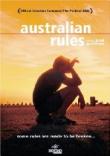 7537950048188573383.jpg
7537950048188573383.jpg
 7537950048188573383.jpg
7537950048188573383.jpg
In Prospect Bay, a remote fishing town in South Australian, the only thing that connects the two communities - the Goonyas (whites) and the Nungas (blacks) - is football. The underlying racism and class warfare threatens to make the team's greatest victories irrelevant, though. Two members of the team, Gary Black (the son of a white fisherman) and Dumby Red (the team's star player), are an exception, however, having been best friends since childhood despite their different cultural and family backgrounds. The jubilation that occurs when the team wins the local premiership is short-lived when Dumby is inexplicably overlooked for the 'best on ground' award. This incident subsequently sets off a chain of events that ends in tragedy.
[Sources: Weekend Australian 22-23 December 2001 pp.14-15 and Australian Screen]
'This paper draws on theories of the gift to address the ethics of representing Aboriginality in Australian children's literature, which is a contentious debate that centres on who is eligible to tell Aboriginal stories and how the stories can be told. Considering the historical indebtedness in Australian racial relations, the paper suggests that children's books that incorporate reference to Aboriginal cultural elements constitute a metaphorical 'gift' exchange between Aboriginal custodians as the givers and writers as the recipients who are expected to 'return' such an intellectual gift through their books in an appropriate manner. In this view, the paper specifies the ethical issues confronted by non-Aboriginal writers for children, including Patricia Wrightson, Phillip Gwynne and Kate Constable, and examines the way in which the gift relationship sheds light on the question of how to avoid infringement of Aboriginal protocols without submitting to self-censorship. A caring gesture, underlining the relationship between self and others in gift exchanges, is identified to negotiate the writer's interests in Aboriginal stories with cultural sensitivity against unauthorised appropriation. The paper therefore argues that the morality of gift exchanges, which demands a balanced consideration of disparate interests in obligatory reciprocation, offers a possible solution to the dilemma of non-Aboriginal writers in the treatment of Aboriginal subject matter.' (Publication abstract)
‘Aboriginality was filtered through a white consciousness that arguably distorted it. Then, beginning in roughly 1980, there were many films that reflected a white social consciousness insofar as they dealt with the injustices that Aboriginal people had experienced. In this essay the author attempts to account for the appearance of Aboriginals behind the camera beginning in the late 1980s. The crucial difference, however, once Aboriginals became artists, not just subjects, was the removal of the filtering white consciousness. Removing that filter had a counterintuitive effect, though: rather than prompting more overt depiction of the story of Aboriginals in white Australia, removing the filter resulted in strategic indirection in the telling of that story. This essay explores that strategic indirection.’ (Introduction)